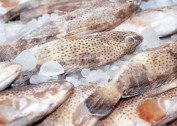
Overfishing is worryingly prevalent in the UAE. The total number of commercially available fish in the country has declined by 80 per cent in the past 30 years, according to a study by the Emirates Wildlife Society and World Wildlife Fund (EWS-WWF).
As a result, the UAE has reached a critical juncture with one of its most desirable catches: the hammour. The orange-spotted grouper is fished at more than seven times the sustainable level and is the most overfished species in the country. Its population in the UAE’s seas has declined by more than 90 per cent in the past 30 years.
Traditional fishing methods are being scrapped and old seafarers are being told to readjust to the modern era. A number of restaurants and businesses in the UAE have taken the hammour off their menus and joined the EWS-WWF Choose Wisely campaign to protect the species.
There are, however, restaurants, hotels and markets that still sell the fish, because it’s too good not to offer to customers.
“There is no species-specific regulation banning the fishing [or consumption] of hammour in the UAE,” Dr Shaikha Salem Al Dhaheri, Executive Director, Terrestrial and Marine Biodiversity, Environment Agency — Abu Dhabi, tells GN Focus.
“Regulations protecting the hammour are based on fishing methods, gear types and management methods, such as the establishment of no-take zones and marine reserves.”
A federal-level minimum size limit bans the capture of hammour under 45 centimetres, which is due to be revised soon.
The Ministry of Environment and Water also imposed a four-month fishing ban in March and introduced stricter regulations to stem unsustainable methods of fishing in the sea.
GN Focus talks to some members of the F&B industry for their insights
Uwe Micheel, Director of Kitchens, Radisson Blu Hotel, Dubai Deira Creek, and President, Emirates Culinary Guild
“We used to serve hammour, and on good days would have a consumption of 50-100 kilogrammes. I served the last fish in January 2012.”
Do customers still ask for hammour?
We still have issues with our guests because they don’t understand. They say, I can go to the fish market and supermarkets and buy hammour, so why can’t I get it here? I then explain what we’re doing. I say, I want your grandchildren to be able to eat hammour again. It’s about raising awareness and talking to the consumer.
Will you serve hammour again in the future?
I hope that we can, but it will take some years for the stock to come back to where it was.
How has the price of hammour changed, since it became widely known it’s a threatened species?
Compared to 10-15 years ago, the price is 5-6 times higher, because there’s less supply. In fact, some places serve hammour dishes in which they don’t even use the fish, which, in my opinion, is cheating.
K.A.C. Prasad, Executive Chef, Iberotel Miramar Al Aqah Beach Resort, Fujairah, and Vice-President, East Coast, Emirates Culinary Guild
“We’ve decided to stop serving hammour because we want to save it. But even when we were serving it, we would ensure that each fish was more than 4-5 kilogrammes in weight and it had no babies.”
Have you noticed an increased demand for hammour since it is being taken off menus?
Most locals love to eat hammour because it is linked to their heritage. So when guests
peruse the menu, they ask why there’s no hammour. It’s our job to explain why we are not serving it anymore.
Why is it still sold in some places in the UAE?
People are worried about losing money from this fish. And consumers still want to buy or consume it. But if we continue to eat hammour for the next three years, there will be none left.
What can be done?
Everybody must make a strong, collective decision: stop buying it, stop selling it. The government should make this decision. I know there are rules for fishermen not to sell baby hammour, but if you go to the markets, they’re there.
Rudolf Segers, Executive Chef, Waldorf Astoria Ras Al Khaimah
“Each property should take the responsibility to protect our wildlife. Hilton Worldwide International does not permit any of its restaurants to serve hammour. Other restaurants and hotels should do the same to preserve the species.”
Do guests still ask for hammour dishes?
Most guests like the variety of dishes on offer, which include sustainable fish and seafood. We are not asked for hammour.
Joachim Textor, Executive Chef, Anantara Dubai The Palm Resort & Spa
“We do not serve hammour, especially since it’s well known that it’s an endangered species. We aren’t asked for it either.”
What should be done to preserve the fish?
Several initiatives are in place in the F&B industry, which is well aware of the situation. It has been discussed by the Emirates Culinary Guild as well. I think driving awareness and sustainably sourcing alternative fish types will ensure the protection of the species.












